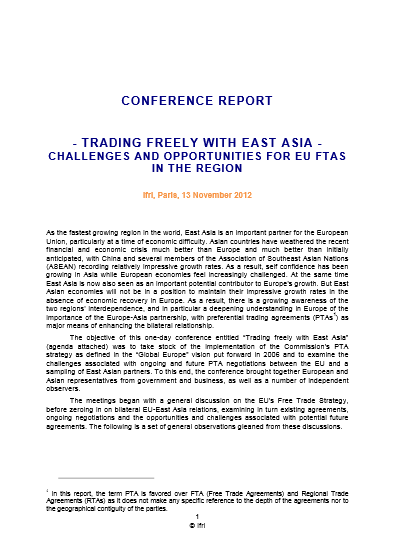Trading Freely with East Asia: Challenges and Opportunities for EU FTAs in the Region

As the fastest growing region in the world, East Asia is an important partner for the European Union, particularly at a time of economic difficulty. Asian countries have weathered the recent financial and economic crisis much better than Europe and much better than initially anticipated, with China and several members of the Association of Southeast Asian Nations (ASEAN) recording relatively impressive growth rates. As a result, self-confidence has been growing in Asia while European economies feel increasingly challenged.
At the same time East Asia is now also seen as an important potential contributor to Europe's growth. But East Asian economies will not be in a position to maintain their impressive growth rates in the absence of economic recovery in Europe. As a result, there is a growing awareness of the two regions' interdependence, and in particular a deepening understanding in Europe of the importance of the Europe-Asia partnership, with preferential trading agreements (PTAs1) as major means of enhancing the bilateral relationship.
The objective of this one-day conference entitled “Trading freely with East Asia” was to take stock of the implementation of the Commission's PTA strategy as defined in the “Global Europe” vision put forward in 2006 and to examine the challenges associated with ongoing and future PTA negotiations between the EU and a sampling of East Asian partners. To this end, the conference brought together European and Asian representatives from government and business, as well as a number of independent observers.
The meetings began with a general discussion on the EU's Free Trade Strategy, before zeroing in on bilateral EU-East Asia relations, examining in turn existing agreements, ongoing negotiations and the opportunities and challenges associated with potential future agreements. The following is a set of general observations gleaned from these discussions.

Available in:
Share
Download the full analysis
This page contains only a summary of our work. If you would like to have access to all the information from our research on the subject, you can download the full version in PDF format.
Trading Freely with East Asia: Challenges and Opportunities for EU FTAs in the Region
Related centers and programs
Discover our other research centers and programsFind out more
Discover all our analysesJapan’s Takaichi Landslide: A New Face of Power
Prime Minister Sanae Takaichi has turned her exceptional popularity into a historic political victory. The snap elections of February 8 delivered an overwhelming majority for the Liberal Democratic Party (LDP), driven by strong support from young voters, drawn to her iconoclastic and dynamic image, and from conservative voters reassured by her vision of national assertiveness. This popularity lays the foundation for an ambitious strategy on both the domestic and international fronts.
The U.S. Policy Toward Taiwan Beyond Donald Trump: Mapping the American Stakeholders of U.S.-Taiwan Relations
Donald Trump’s return to the White House reintroduced acute uncertainty into the security commitment of the United States (U.S.) to Taiwan. Unlike President Joe Biden, who repeatedly stated the determination to defend Taiwan, President Trump refrains from commenting on the hypothetical U.S. response in the context of a cross-Strait crisis.

China’s Strategy Toward Pacific Island countries: Countering Taiwan and Western Influence
Over the past decade, China has deployed a diplomatic strategy toward the Pacific Island Countries (PICs). This strategy pursues two main objectives: countering Taiwan's diplomatic influence in the region and countering the influence of liberal democracies in what Beijing refers to as the "Global South."

Opening up the G7 to South Korea to Address Contemporary Global Challenges
The G7’s global influence has diminished as powers like China reshape international governance through initiatives such as BRICS and the Shanghai Cooperation Organisation (SCO). With the G7 now representing just 10 per cent of the world’s population and 28 per cent of global GDP, its relevance is increasingly questioned.








